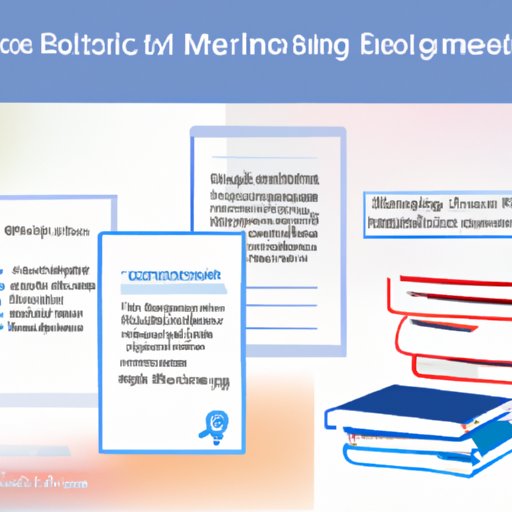Introduction
Evidence-based literature is a type of scholarly writing that is based on rigorous research and data. It is used in the healthcare field to inform decision-making, improve clinical practice, and promote better patient outcomes. This type of literature is becoming increasingly important as healthcare professionals strive to provide the best care possible for their patients.
Definition and Overview of Evidence-Based Literature
Evidence-based literature is defined by the National Library of Medicine as “the conscientious, explicit, and judicious use of current best evidence in making decisions about the care of individual patients.” In other words, it is literature that is based on the most up-to-date research and data available in order to make informed decisions and provide the best possible care to patients.
Evidence-based literature can come in many forms, including scholarly articles, reviews, guidelines, and protocols. These pieces of literature are often published in medical journals or online databases, such as PubMed or Cochrane Library. They may also be found in textbooks or other educational materials. In addition, evidence-based literature can be used to create patient education materials or quality improvement strategies.
Benefits of Evidence-Based Literature
Evidence-based literature provides a wealth of information to healthcare professionals that can help them make more informed decisions about the care of their patients. By utilizing this type of literature, healthcare professionals can ensure they are providing the highest level of care possible. Additionally, evidence-based literature can provide guidance on best practices and help clinicians stay up-to-date with the latest developments in the field.
Furthermore, evidence-based literature can also be used to educate patients about their condition or treatment. It can provide valuable insight into potential risks and benefits, as well as potential side effects. By having access to this information, patients can make more informed decisions about their health and well-being.
How to Find Evidence-Based Literature
There are several sources where evidence-based literature can be found. The most common sources are databases, journals, and textbooks. Databases such as PubMed and Cochrane Library are the go-to source for many healthcare professionals when searching for evidence-based literature. These databases provide access to thousands of articles, reviews, and guidelines related to various topics. Journals such as the New England Journal of Medicine and JAMA are also great sources for evidence-based literature.
In addition, textbooks and other educational materials are also useful sources of evidence-based literature. These materials provide detailed information on various topics and can be used to supplement the information found in databases and journals. Finally, conferences and workshops are also good sources for evidence-based literature, as they typically feature presentations from leading experts in the field.
Challenges of Implementing Evidence-Based Literature
Although evidence-based literature can be a valuable resource, there are some challenges that must be considered when implementing it. One of the primary challenges is the time commitment required to find and review relevant literature. Healthcare professionals must dedicate a significant amount of time to search for and read through the literature in order to make informed decisions.
Another challenge is the cost associated with accessing evidence-based literature. Many databases, journals, and textbooks require a subscription or fee in order to access the content. Additionally, attending conferences and workshops can also be costly. Finally, accessibility is another challenge, as not all healthcare professionals have access to the same resources.
Examples of Evidence-Based Literature in Practice
Evidence-based literature can be used in a variety of ways in the healthcare field. Clinical research studies are one of the most common uses of evidence-based literature. These studies provide valuable insight into the effectiveness of treatments and interventions, which can then be used to inform decision-making. Patient education materials are also a great way to utilize evidence-based literature. These materials can provide patients with valuable information about their condition or treatment, which can help them make more informed decisions.
Finally, evidence-based literature can be used to develop quality improvement strategies. These strategies can be used to identify areas of improvement within an organization and develop plans to address those issues. By utilizing evidence-based literature in this way, healthcare organizations can ensure they are providing the best possible care to their patients.
Impact of Evidence-Based Literature on Healthcare Outcomes
The implementation of evidence-based literature has had a positive impact on healthcare outcomes. Research has found that evidence-based literature can lead to improved quality of care, reduced costs, and increased efficiency. For example, a study published in the Annals of Internal Medicine found that implementing evidence-based guidelines led to a decrease in mortality rates and an increase in patient satisfaction.
Additionally, research has found that evidence-based literature can help reduce costs by reducing the need for unnecessary tests and procedures. Finally, evidence-based literature can also help increase efficiency by streamlining processes and providing guidance on best practices. Overall, the implementation of evidence-based literature has had a positive impact on healthcare outcomes.
Conclusion
Evidence-based literature is an important tool for healthcare professionals. It can provide valuable information to help clinicians make informed decisions and provide the best possible care to their patients. Additionally, evidence-based literature can also be used to create patient education materials and quality improvement strategies. Furthermore, research has shown that evidence-based literature can lead to improved quality of care, reduced costs, and increased efficiency. Ultimately, evidence-based literature is an invaluable resource for healthcare professionals and can have a positive impact on healthcare outcomes.
(Note: Is this article not meeting your expectations? Do you have knowledge or insights to share? Unlock new opportunities and expand your reach by joining our authors team. Click Registration to join us and share your expertise with our readers.)
